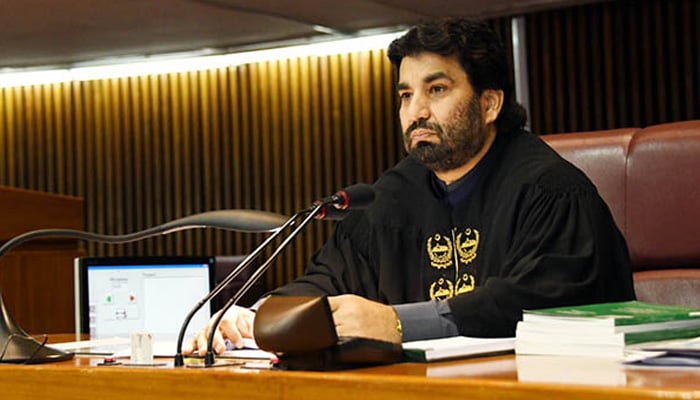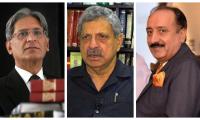Destroying democracy from within
The deputy speaker’s ruling is far more troubling as a matter of law
Marx said that history repeated itself, the first time as tragedy, the second time as farce. But what about the third time? Or the fourth? Or the twentieth? Do the tragic and farcical elements alternate or do they commingle into ever-darkening but co-equal shades of pathos and stupidity?
Given the events of this past Sunday, my bet is on the latter. But let us first examine the facts.
On August 17, 2018 Imran Khan was elected as the prime minister of Pakistan by 176 members of the National Assembly, of whom seven members were from the Mohajir Qaumi Movement Pakistan (MQM-P) and five were from the Balochistan Awami Party (BAP).
On March 8, 2022 the opposition filed a motion for a vote of no-confidence signed by the requisite number of MNAs.
On March 27, 2022 four members of the BAP announced that they would be voting against PM Imran Khan.
On March 29, 2022 the MQM-P announced that it would no longer be supporting PM Imran Khan but would instead be supporting the vote of no-confidence. The announcement was significant because it rendered the debate in relation to Article 63A as to whether the votes of defecting PTI members could be counted in relation to a vote of no confidence. Instead, as of the date of the MQM-P’s announcement, Prime Minister Imran Khan clearly no longer enjoyed the confidence of a majority of parliament.
On April 3, 2022 the motion for a vote of no-confidence was due to be taken up by the National Assembly. Prior to the motion being voted upon, the recently nominated federal minister for law rose on a point of order and argued that the motion was illegal because it was being conducted at the behest of a foreign power. Immediately thereafter, the deputy speaker presiding over the proceedings, Mr Qasim Suri, held that the motion was indeed illegal. And as the opposition milled about in angry confusion, the nation was informed that Prime Minister Imran Khan had advised the president to dissolve the National Assembly and that the president had been pleased to approve the summary for such dissolution.
Like all controversies of great import, this too has been shovelled onto the Supreme Court’s doorstep. Chief Justice Bandial has taken suo motu notice and is holding hearings on a day-to-day basis.
In the meantime, there are two questions to consider. Is the deputy speaker’s ruling justifiable? And if not, does the Supreme Court have the option to intervene?
The deputy speaker’s detailed ruling contends as follows: (1) that a letter sent by a Pakistani ambassador letter as well as the information provided in a briefing to the Parliamentary Committee on National Security showed that “there was nexus between no-confidence motion against Prime Minister and the foreign intervention”; and (2) these facts required a “thorough investigation by the appropriate forum” because otherwise, the danger was that Pakistan’s sovereignty would be irretrievably compromised.
This argument is not sustainable for multiple reasons, both of fact and of law.
In terms of facts, the only evidence mentioned by the learned deputy speaker in his ruling for this grave allegation is a letter dated March 7, 2022 supposedly sent by Pakistan’s ambassador to the United States regarding his discussion with Donald Lu, the US assistant under-secretary of state for South & Central Asia. I use the word ‘supposedly’ since the letter has yet to be disclosed publicly and, as of now, there are allegations that its contents have been misrepresented by the PTI government.
So far as the contents of the letter have been publicly described, the most that has been claimed is that the Pakistani ambassador was told that if Imran Khan continued as PM, there would be horrific consequences for Pakistan. There is no allegation in the letter that Mr Lu confessed to being responsible for the vote of no-confidence. The learned deputy speaker’s conclusion that the motion for a vote of no-confidence was at the behest of a foreign power is therefore based on precisely zero evidence. Even if we assume that the United States does want Imran Khan removed as PM, and that this desire is shared by the combined opposition, correlation is not causation.
The deputy speaker’s ruling is far more troubling as a matter of law. A member of parliament who acts on the behest of a foreign power would be guilty of treason or, more prosaically, of acting “in a manner prejudicial to the sovereignty, integrity or security of Pakistan.” Under Article 63A, a person who acts in such a manner is liable to be disqualified but, and here’s the kicker, if and only if “he has been convicted by a court of competent jurisdiction.”
By preventing the members of the opposition from voting, the deputy speaker acted illegally because there is -- till date -- no judgment of a competent court stating that every member of the opposition was guilty of treason.
The same principle operates at the level of political parties. A political party which operates in a manner prejudicial to the integrity of Pakistan can be declared illegal by the federal government. However, under Article 17 of the constitution, the federal government must submit a reference to this effect directly to the Supreme Court. No such reference has been filed till date. The deputy speaker’s ruling is therefore also illegal because it usurps the role of the federal government and the Supreme Court of Pakistan.
There is a good reason why the Constitution reserves such judgments for the courts and does not leave them to partisan politicians. If today, the entire opposition can be disenfranchised on the basis of one man’s suspicions of treason, then tomorrow the entire opposition can be disenfranchised on the basis of different suspicions. No parliamentary system can work in such a manner.
The argument that Article 69 prevents the Supreme Court from overruling the deputy speaker is equally feeble. Article 69 is expressly limited to “irregularities of procedure.” Disenfranchising the entire opposition on the basis of unverified allegations is not an “irregularity of procedure.” It is a travesty. In any event, there are multiple judgments stating that courts may intervene on substantive grounds.
Pakistan has a tortured history of slowly moving towards democracy. At every step of the way, we have heard pundits intone that our people are too stupid to be entrusted with real power, that democracy does not suit the genius of our people and that left to themselves, the bloody civilians will invariably make a hash of government. As always, the people are blameless. It is their leaders -- and in this case, specifically Imran Khan -- who have proven themselves unfit for democracy.
Ours is a parliamentary system, not a presidential system. The foundational unit of our democracy is not the voter but each of their elected representatives. It is theoretically possible that an MNA may commit treason. But to casually impute treason to almost 200 parliamentarians on the basis of an unverified letter containing impressions of a month-old conversation is to hold all parliamentarians in contempt. I understand that Mr Suri took this step to please the prime minister. But Mr Khan is not above the system. To the extent he enjoys our respect as the prime minister, he holds that office by virtue of the votes of the same parliamentarians he now calls traitors.
-
Security forces gun down 30 terrorists in multiple IBOs in KP: ISPR
-
MQM-P calls for new province in Sindh
-
US report validates Pakistan military edge over India: PM
-
Banned TTP poses serious threat to Pakistan security: UNSC panel
-
CM Afridi clarifies remarks on by-poll after ECP requests army deployment
-
Dubai sees 3.2m Pakistani passengers in 2025 as airport sets new milestone
-
Security forces kill 23 Indian proxy terrorists in KP's Kurram
-
Pakistan to construct island to boost oil exploration: report













